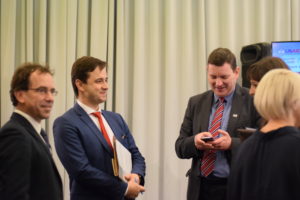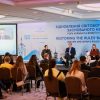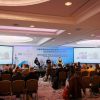After the Russian aggression the South of Ukraine has reconsidered its attitude towards the West and Russia, it hasn’t entirely embraced the pro-European agenda, while its attitudes and perceptions often remain out of Kyiv’s sight and attention. This was discussed during a presentation of the NEC discussion paper “Talking Business: How to Keep Southern Ukraine Engaged in European Integration?” about attitudes towards European integration of the citizens of Odesa and Kherson that was held on November 06. This paper was prepared following the results of public discussions in Odesa (September 27) and Kherson (September 28) organized by the New Europe Center, as well as interviews with local opinion leaders.
The speakers include: Juris Poikāns, Ambassador Extraordinary and Plenipotentiary of Republic of Latvia to Ukraine; Kateryna Zarembo, Deputy Director of the New Europe Center; Leo Litra, Senior Research Fellow at the New Europe Center; David Stulik, Press officer, Delegation of the European Union to Ukraine; Zoya Kazanzhy, Writer, Communication expert in the project “Communication of Europe in Ukraine”, E’COMM agency.
Main theses of the speakers of the presentation.
Leo Litra, Senior Research Fellow at the New Europe Center
In general, the population of the southern regions of Ukraine is skeptical towards the European integration.
- “The public support for European integration has changed very much for the last two years. In Odesa oblast, we have 50% of the population against European integration, 24% – supporting European integration. The rest of them are calling themselves neutral. Although, in 2016 there were 40% of people in Odesa oblast supporting integration. The same is with Kharkiv, where 49% of the residents are against European integration. If we look at Kherson oblast, we see that 36% are against, 43% are in favor”.
Miscommunication provides for the distorted understanding of the European integration among the population.
- “Sometimes people look at the European integration in tandem with NATO. We still need to work on communication, because they understand that these organizations are different, but they think that Ukraine will integrate into the EU only if it integrates into NATO that is not true”.
Kateryna Zarembo, Deputy Director of the New Europe Center
Citizens of Odesa may not support the European integration because of trade relationships. They do not understand their benefits, as long as a major part of the goods is exported into non-European countries.
- “Among top-9 geographical partners of Odessa, $ 550 million belong to countries that are neither European, nor Russia, such as India, Turkey, Saudi Arabia, Egypt, and China. The amount of export with Russia has decreased by 5,5 times. Odessa is per se because its trade relations are not intense both with Russia and the European Union”.
Transport service plays an important role in the positive perception of the European integration.
- “Transport service in Odesa does not contribute to the European integration. Despite having a quite developed airport, Odesa still does not cooperate with European low-cost airlines. However, in Kherson transport communications (with the EU), especially buses, has intensified since 2014”.
The population of the southern Ukrainian region does not share a single position toward security situation.
- “The conflict in the East of Ukraine is not considered to be a threat to the security of Odesa region. The conflict in Transnistria is a bigger threat, again, because of Russia and Russian troops. While in Kherson situation is different – it feels as a last security stronghold on the delimitation lines”.
Juris Poikāns, Ambassador Extraordinary and Plenipotentiary of the Republic of Latvia to Ukraine
European integration and popular central government are intertwined.
- “I think that the reason why European integration popularity is dropping in Odessa and Kharkiv is largely connected with a central government. If you have a more popular government, you have more support for the European Union”.
- “In Odesa you have a feeling that that is a state within the state – due to its own identity, geography and specific history with Russia”.
“Neutrality” of citizens of Odesa may be related to an attempt to find a compromise with Russia.
- “One thing is people probably hiding their real attitudes when it comes toward Russia. But might be a segment of people who feels themselves being neutral between Russia (because there is a war with Russia) and European Union (because EU is very complex and diverse for they). And some people perceive neutrality in a way to find some kind of compromise with Russia”.
David Stulik, Press officer, Delegation of the European Union to Ukraine
The population of the southern regions has perceived the European integration differently before and after Maidan.
- “Before Maidan, in the south, there were, in general, people opposing the European integration. In June social surveys showed that 35% of the population is in favor of integration, 25-27% – support integration with the Customs Union and the rest is neutral”.
- “The number of those who support joining NATO has increased after the events in the East. However, this number decrease that can be explained by the only one reason – aggressive Russian propaganda”.
Strong middle class in the south is a principal supporter of the integration.
- “As for the European integration in the South of Ukraine, I am calm, because there is a small and medium-sized business that understands dangerous of a repeat of the situation in the East of Ukraine. In addition, the development of agriculture is important. More contacts in this area will improve the attitude towards the Euro-integration path. The second factor for positive forecast is increased number of the lowcost in the South of Ukraine, the reconstruction of the airport in Kherson and the development of tourism”.
Improvement of the transport service is dramatically important for the positive perception of Europe among the population.
- “The South region takes the second place, after East, for the number of visa-free trips to Europe. Reconstruction of Kherson airport was a good decision. We hope, that the Treaty on Open Skies between the EU and Ukraine will be signed soon. That will increase the attractiveness of these regions because they have much to show the world”.
Zoya Kazanzhy, Writer, Communication expert in the project “Communication of Europe in Ukraine”, E’COMM agency
Representatives of small and middle-sized business played an active role in Maidan.
- “Maidan in Odesa consisted of representatives of small and middle-sized business. They are people who created their lives notwithstanding the authority, who traveled and worked in Europe. The first thing that mattered in 2014 was pragmatism, not patriotism”
Pro-Ukrainian position is actually equal to the pro-European one in Odesa.
- “Approximately 20% of the population in Odesa has a clear pro-Ukrainian position. Pro-Ukrainian position in Odesa, ipso facto, equals pro-European one…Russian speaking is not always supporting Russia and Putin. According to the survey held in 2015, Russian speaking population can be pro-Putin, pro-Ukrainian, as well as Ukrainian nationalists”.
- “There is a great amount of Ukrainian language in Odesa. The young generation speaks Ukrainian, Russian and English. This year 92% of parents expressed their desire to have their children taught in Ukrainian speaking classes”.
All photos from the presentation are available at the link
The event was held within the framework of the project implemented under the USAID/ENGAGE activity, which is funded by the United States Agency for International Development (USAID) and implemented by Pact. The contents of the event are the sole responsibility of New Europe Center and Pact and do not necessary reflect the views of USAID or the United States Government













